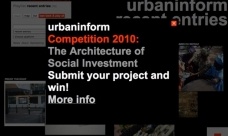
newspaper
competitions
Brief
The architecture of social investment engages in social and green business strategies to shape the future of our cities. If major parts of our contemporary cities are self-built by their inhabitants, how can they be supported to do so in accordance with societal and ecological requirements? How can architecture and urban design support socially engaged business to foster sustainable urban development? How can a local project become a model for other communities?
The urbaninform Competition 2010 is calling for architecture and urban design projects, which engage in and cooperate with social entrepreneurship and green business. The project should be realized or developed to the level of being implemented.
Are you an architect, an urban designer, a social entrepreneur, a government official, a foundation or simply an individual or group engaging in the sustainable future of our cities?
Does your project empower individuals and communities to become economically independent?
Does your project understand architecture as business opportunity?
Does your project allow the community to generate or maintain services, infrastructure and education facilities?
If your project is a social investment, submit and win!
Background
More than half of the world’s population is living in cities. Most of those cities are growing informally, with little or no professional planning intervention. One third of this urban population - about one billion people - can be considered urban poor, living in sub-standard conditions. And their number is growing. The investment required for the prevention and upgrading of their precarious housing is estimated to reach over 300 billion US$ in the coming 20 years. No government will be able to finance this upgrading process.
The emergence of this urban growth phenomenon and alternative economies are intrinsically related. It is the urban population that is constructing the city, doing business, cooperating, socializing and organizing it! It is time to reevaluate these self-organizing powers and support new ways of urban governance.
Social and green businesses are new domains combining entrepreneurship with social and ecological values. They establish links between civic society and private industry. Social and green businesses are important players in good urban governance initiatives fostering the cooperation of government, civil society and private industry.
The competition is looking for design projects that reflect this new spirit of sustainable urban production. How can we shape new models for socially inclusive and ecologically sustainable urban economies? How can projects support ecological responsibility, economic independence and social emancipation?
Until now, few efforts have been undertaken in relating social business initiatives with the making of the territory they are taking place in: the city. In the future, architecture and urban design will play a crucial part in developing strategies and tactics along with sustainable business initiatives – for a better, socially just and ecologically sound urban environment.
Prices
With the support of Noah Foundation, the 2010 urbaninform competition awards the following prizes:
1st Prize
USD 2’000
2nd Prize
USD 1’500
3rd Prize
USD 1’000
Submission
Go to www.urbaninform.net. Become a Member. Log in and create a mini documentary on your project online and complete the info-sheet (it is one step in the production process of your mini documentary). This process does not have to be completed at once, you can always pause and save your work.
When you have posted your mini documentary successfully, please send us an email to: lange@urbaninform.net with: your (1) name, (2) name of your organization, (3) address, (4) title of mini-documentary and (5) a text of max. 500 words explaining why your project is an architecture of social investment according to the competition brief.
Your completed mini documentary and your email are the required submission formats.
The judges’ decision is final.
Social Investment Criteria
One or more of these might apply to your project:
Economic
* Empowering individuals and communities to become economically independent * Spaces and buildings allowing for and supporting business opportunities * Spaces and buildings which themselves generate income * Spaces that support the concept of good urban governance * the cooperation of government, civil society and private industry
Social
* Equality of opportunities in development * Community empowerment and participation in governance processes * Fostering tolerance, education, cultural diversity or social mix
Ecological
* Responsible use of resources in construction and maintenance * Improvement of the urban climatic and living condition * Infrastructure for the better management of waste, water and energy
Design
* Innovation in design and construction * Spaces performing according to the needs and lifestyles of their users * Spaces of gathering and interaction
Timeline
Announcement of competition: September 1st, 2010
Submission deadline: November 1st, 2010
Announcement of winners: December 10th, 2010, Center for Architecture, New York
at the urbaninform Podium “The Architecture of Social Investment”
Jury
Dr. Susan Draeger, Buro Happold
Rainer Hehl, urbaninform / ETH Zurich
Dr. Andres Lepik, Museum of Modern Art New York
Dr. Andreas Renner, GEXSI
Peter Spiegel, Genesis Institute
Prof. Jörg Stollmann, urbaninform / TU Berlin
Dr. Fran Tonkiss, London School of Economics
Partners
GEXSI, Genesis Institute, Noah Foundation, Consulate General of Switzerland in New York, ThinkSwiss, Museum of Modern Art New York


